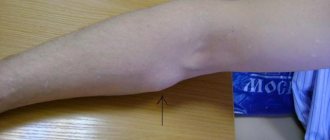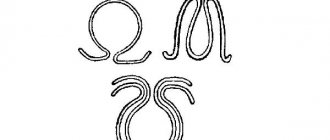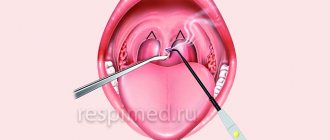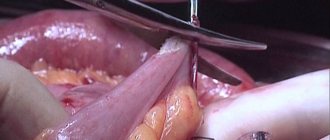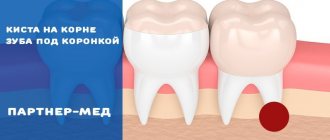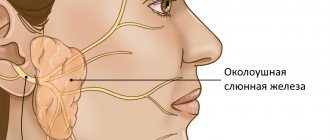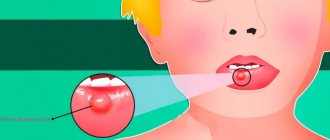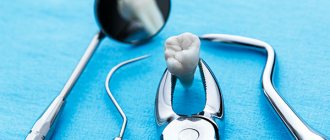What is the tongue silent about? Yes, yes, today we will tell you about a small conical-shaped process that hangs over the root of the tongue. Why, in fact, about him? This topic was prompted by a question from one of the patients: “why is it needed, this tongue?” And we thought, why not tell us more about it. After all, practically no one pays attention to him! Nevertheless, the tongue performs many important functions! And we decided to restore justice! So, the uvula, or uvula palatine, is a small conical process of the posterior edge of the soft palate, consisting of connective tissue.
Functions of the uvula
Firstly, our tongue is able to separate air flows and sets their further direction of movement. Because it is a continuation of the soft palate. And the soft palate, when functioning normally and largely thanks to the tongue indicator, is a natural partition between the oral and nasal cavities.
Secondly, the tongue separates the flow of food, preventing it from entering the pharynx. Are you interested in knowing how this happens? Please! When food touches the tongue, it provokes a spasm in the throat, which prevents the person from choking. This little giant is able to trigger, if necessary, a gag reflex, saving us from intoxication. Remember? “Two fingers in your mouth?”
Thirdly, it protects, as best it can, from the penetration of a flow of cold air, warming it (the air) with its own vessels. Yes, the tongue has not only its own vessels, due to which it swells during the inflammatory process in the throat, but also its own muscles, covered with a mucous membrane.
How is the operation performed at CELT?
In order for the removal of the uvula to have exclusively positive consequences, it must be carried out in a multidisciplinary CELT clinic. Before prescribing this operation, our specialists carry out a comprehensive diagnosis, which allows us to make a correct diagnosis. The operation itself can be performed using different techniques. The most effective and least traumatic for the patient are radiosurgery and laser techniques. These methods help avoid bleeding and reduce postoperative trauma.
Exercises and gymnastics for snoring
Exercises for snoring
To overcome snoring in non-serious stages, you need to do anti-snoring exercises. They are quite simple to make and use. Each of us can do them. Below are some exercise options to do throughout the month. Start following the following recommendations, and the effect will not be long in coming. Exercises should be done twice a day - morning and evening.
Exercise "Bulldog". If you have seen a bulldog at least once in your life, you will do this exercise with ease. It is enough to push the lower jaw forward to the maximum distance.
The teeth of the lower jaw should be in front of the upper ones. Leave your jaw frozen for 10 seconds, then return it to its normal position. Do 15 sets, with a 40-second break between each set.
Exercise "Squeaker". Pronounce all vowel sounds in order, while simultaneously straining the muscles of the larynx and soft tissues of the nasopharynx. Repeat the gymnastics 40 times. These steps must be repeated morning and evening. It is better to take water into your mouth and raise your head up.
Exercise "Sparrow". Here you need to open your mouth wide, supporting the lower jaw with your fingers and lightly pressing on it. But don't overdo it! In this case, you need to simultaneously resist the movement of your fingers and raise your head up. This way you need to train the muscles that support the jaw. Do the exercise for 5 minutes, then close your mouth and give your muscles a break.
Exercise "Chewing Gum". This anti-snoring exercise is familiar to everyone who has chewed gum at least once in their life. The essence of this exercise is based on the fact that it is necessary to perform circular movements with the lower jaw in the same way as when chewing. The main thing is not to rush.
An important factor here is also maintaining respiratory balance: you need to breathe evenly, calmly, without rushing anywhere. The exercise must be performed for 10 minutes with breaks of 3-4 minutes.
Exercise "Teasing". The tongue must be pushed forward with maximum force and pulled down. Try to keep a part of your body in this state for 5 seconds. After this, take the starting position. The exercise must be repeated 30-50 times with breaks of a few seconds.
Exercise "Wand". Take a stick of any material and clamp it. You need to hold the object for 5 minutes while tensing the muscles of your face and throat. You need to repeat the exercise in sets of 3 times, after which you take breaks. The exercise is performed at night before bed and takes about 30 minutes. This exercise will not get rid of snoring during deep sleep, but it will help when falling asleep.
The fight against snoring with the help of exercises can be carried out not only in the initial stages, but also with the so-called apnea syndrome. This requires performing gymnastics, which is aimed at maintaining the tone of the neck and nasopharynx. These are described below.
1. Exercise 1. Place a piece of rubber hose on a pen or pencil and grab it with your jaw. It needs to be completely clamped by your real teeth. After this, using great force, squeeze the object with your teeth and relax your jaw. The exercise should be repeated 10-14 times with short breaks of a few seconds.
2. Exercise 2. Stick your tongue forward and up, try to touch it to the tip of your nose. Hold for 3 seconds. Return your tongue to its original position. Repeat five times, breaks for 3 seconds.
3. Exercise 3. Similar to exercise 2. We lower the tongue down and try to touch the chin for 5 seconds. We repeat the exercise five times with short breaks.
4. Exercise 4. From several positions, with any two fingertips, begin to tint the lower part of the face. Apply forceful pressure to the lower part of your face, while trying to gradually open your mouth. Repeat twenty times with short breaks.
5. Exercise 5. Press your chin and start moving it slowly in different directions. The chin should be supported with the palm of your hand. Repeat for 10 minutes with short breaks.
6. Exercise 6. Open your mouth and make circular movements with your lower jaw counterclockwise. Repeat this ten times, and after this the movements are performed clockwise. The exercise should be performed carefully, without strong efforts.
7. Exercise 7. In this exercise you should hum the vowel “s”. In this case, it is necessary to strain the muscles of the neck, throat and soft tissues. You need to pronounce this sound ten times, maybe more.
women don't like it when men snore
How to overcome snoring is written above. Now we will offer exercises to reduce the sound and frequency of snoring. Training the muscles of the nasopharynx, lower and upper jaws and tongue gives excellent results and helps get rid of the symptom. The main thing is to do such gymnastics without breaks.
1. It is necessary to push the tongue forward and down to its maximum length; you need to feel the tension of the nasopharyngeal muscles at the very root of the tongue. Hold it in the extended position for 3-4 seconds and at the same time hum the drawn-out “y” sound. Perform several approaches 40 times a day. Such gymnastics will strengthen the muscles of the uvula, palate and tongue.
By exercising regularly for a month, you can significantly reduce snoring and achieve a sustainable effect. “Whistling” completely prevents the occurrence of snoring in the future. If you breathe and whistle at the same time, the muscles of the larynx and palate are trained.
When you are walking outdoors, try to breathe and whistle at the same time. In this case, the head should be held high, the shoulders should be spread wide, and the steps should be equally long.
Exhale for 8-9 steps while whistling your favorite song tune. Whistling in this way for your health for half an hour every day or 5-6 approaches a week in a suitable place and at a suitable time.
Repeat “y” with effort 30-40 times, the best way is to sing it. At the same time, the muscles of the uvula of the palate and the walls of the nasopharynx are trained. In the same way, it is useful to pronounce the sound “i” in a drawn-out manner and sing it. After a month of such singing lessons, your household members will most likely be able to sleep in complete silence, because you will get rid of snoring.
Exercise to strengthen the larynx: press firmly with your tongue on the upper palatal part. The exercise should be done until you get tired. This will mean that your muscles are under maximum tension, which is good.
Exercises to strengthen the upper soft tissue of the palate:
Close your mouth and start breathing through your nose. Pull your tongue forcefully towards the nasopharynx, repeat 20-30 times. It is necessary to perform several approaches per day with breaks between exercises of several seconds.
In the morning and evening, gargle with a solution of soda or sea salt (dissolve a teaspoon in one glass of boiled water) and finish with “gurgling”: throwing your head back, push the air out of yourself, causing the water to “gurgle” like in a fountain. You can also use sea water, which will also help. Do these movements for 5-7 minutes. After use, the water should be spat out and not swallowed.
Recently, more and more often on the Internet you can find a new method of defeating snoring, which has found widespread use among the population of the country. This is the so-called Strelnikov breathing exercises. This type of healing is natural and has no bad consequences. This complex consists of many exercises that:
- bring the bronchopulmonary system to a normal state,
- train the diaphragm and internal muscles of the respiratory organs,
- massage almost all abdominal organs,
- saturate with oxygen and activates general metabolic processes at the cellular level,
- By strengthening the walls of blood vessels, blood pressure returns to normal.
Anti-snoring ring
With regular gymnastics, the airways are restored and the snoring process stops. It also helps eliminate other painful processes associated with the respiratory system.
If you miss at least one lesson, then the next day you need to work for both that day and the missed one. But in addition to maintaining regularity, it is also necessary to comply with other requirements - limit food intake, stop sleeping on your back, do not drink alcoholic beverages, and so on. Taken together, these exercises will help you get rid of snoring forever.
All furniture companies now produce orthopedic pillows for snorers. These devices help prevent your tongue from sinking while sleeping on your back. But Swedish inventors have already come up with the most suitable option - a smart bed.
This device is a regular bed, but with built-in sleep sensors. When a person begins to snore, the sensors move the sleeping area to the desired position, that is, I raise the head part. This device is only good for positional snoring.
All anti-snoring medications are available in pharmacies without a doctor's prescription. But with the variety of drugs available today, it is still better to consult a specialist for advice.
The specialist will select individual treatment for you, which will most likely only be beneficial. If you purchased a remedy, but it does not help within several weeks, then it is better to resort to more comprehensive help.
And, of course, it is necessary not only to swallow handfuls of pills, but also not to forget about gymnastics, thereby maintaining muscle tone.
Only comprehensive treatment can help with this diagnosis. If you follow all of the above methods, snoring will disappear within a month.
Anecdote about the stove-maker and snoring
Snoring treatment (video)
hrap-net.ru>
Treatment of bifurcated uvula
Photo: Wikipedia
Bifid uvula is a benign condition and therefore does not require treatment. However, it is important that a child born with a bifid uvula be evaluated for a possible submucous cleft palate. A cleft palate may require surgery.
The most common reason for treatment is a speech disorder where air escapes through the nose.
A person may also have a condition known as velopharyngeal insufficiency, a submucous cleft palate. Surgery is then necessary to restore the palate and close the cleft. In some cases, as an alternative to surgery, the surgeon may insert a special device that is placed in the mouth and attached to the teeth to help with speech problems.
If a child has problems with feeding and swallowing, these can sometimes be solved using techniques shown to parents by a feeding consultant. Children with a submucosal cleft palate often have problems with fluid entering the tympanic cavity and associated infections, which can lead to hearing loss. Ear problems should be treated by a specialist. Treatment includes antibiotics or insertion of ventilation tubes into the eardrum. This should be done as early as possible, as the child may lose hearing, which in turn may also affect speech.
For most people, cleft uvula does not cause any complications and they can lead normal, healthy lives.
Hypertrophy of the palatine tonsils
Classification
There are three degrees of enlargement of the palatine tonsils:
- First degree - a third of the distance from the edge of the palatine arch to the uvula is blocked.
- Second degree - lymphoid tissue fills two-thirds of the space.
- Third degree - the tonsils “meet” at the uvula and touch each other.
According to the forms of the disease, they are distinguished:
- Hypertrophic form (physiological and age-related anomalies).
- Inflammatory form (bacterial infections).
- Hypertrophic-allergic form (accompanied by allergic symptoms).
Symptoms
The earliest manifestations of the disease are discomfort when swallowing and a feeling of a “lump in the throat.” Then there is difficulty in nasal breathing, sleep disturbance, snoring, whistling noise when breathing, coughing and mouth breathing.
With hypertrophy of the second and third degrees, the mobility of the soft palate decreases, articulation is impaired, nasal sound, slurred speech, and distortion of words appear. The patient constantly breathes through the mouth, since the choanae are blocked by the tonsils and swollen mucosa. Attacks of night apnea (stopping breathing during sleep) appear. Hearing progressively worsens.
Complications
All complications are associated with impaired patency of the Eustachian tubes and choanae. Violation of the outflow of secretions from the nose provokes the addition of a bacterial infection in the air cavities and middle ear.
Due to discomfort during swallowing, dysphagia appears, manifested by weight loss, vitamin deficiencies and gastrointestinal disorders. Due to chronic lack of oxygen, the nervous system suffers.
Diagnostics
The diagnosis is made by an otolaryngologist based on the following information:
- Complaints and anamnesis.
- Pharyngoscopy (size, color, nature of the surface and consistency of the tonsils).
- Clinical blood test (increased leukocytes, eosinophils, accelerated ESR).
- X-ray of the nasopharynx (degree of lumen overlap).
Differentiation is carried out with tonsillitis, lymphosarcoma, tonsillitis, intratonsilal abscess.
Treatment
Therapy depends on the degree of enlargement of the tonsils and is divided into several stages:
- Drug treatment: Treatment of mucous membranes with antiseptics
- Lymphotropic drugs.
- Ozone therapy
The prognosis for life and health is favorable. After the operation, recovery is rapid, breathing and speech return to normal. In children, first-degree hyperplasia may disappear on its own as the child grows. Specific prevention has not been developed.
Recommendations
- a full examination before surgery .
- For 14 days after surgery, you must avoid eating spicy, too salty, sour, hot and hard foods. Limit consumption of canned foods. During the entire rehabilitation period, you need to consume only liquid or semi-liquid food.
- Eliminate alcoholic beverages and nicotine from your diet.
- It is necessary to gargle with an antiseptic solution throughout the entire rehabilitation period.
- It is prohibited to engage in excessive physical activity and visit bath complexes, saunas, and take hot baths.
- You should see an otolaryngologist once a year.
Can snoring be cured?
COSIC
There can be many reasons for snoring! These are a deviated nasal septum, hypertrophy of the nasal turbinates, chronic tonsillitis, an enlarged uvula on the soft palate, and polyps in the nose. You need to go either to a respiratory center or to an ENT doctor. Any problem can be corrected promptly. Most often, a uvaloplasty operation is performed (cutting the uvula of the soft palate) and the problem goes away.
oldest
Firstly, you need to wean yourself from sleeping on your back when snoring is caused by a sunken tongue. Naturally, you won’t be able to retrain your body on your own. To do this, it is usually advised to do the following: at night, wear pajamas with a tennis ball embroidered on the back. You will have to wait about a month for your body to readjust. Comfort while sleeping will, of course, suffer from this. But still, if it is important for you to get rid of snoring on your own without medications or surgery, then this is one of the best solutions to the problem. But, unfortunately, sleeping on your side does not always have a positive effect. The result may be that it will not be possible to completely get rid of snoring, but only its strength will decrease. Then, in addition to the method described above, you can use a set of exercises to strengthen the tongue muscles of the soft palate and tongue. First, tongue movements. First, try to stick your tongue forward, as you do when showing a sore throat to the doctor. The more effort you put in, the better - you should feel the muscles at the base of your tongue tighten. Repeat this exercise 30 times. Then, in contrast, try moving your tongue back toward your throat that number of times. Secondly, you can work on your jaw. Moving your lower jaw back and forth about 30 times will also help strengthen weak muscles. Then take an object in your teeth and hold it with force for 5 minutes. Don't expect quick results from these exercises. But if you repeat every day morning and evening, definitely the improvements will be noticeable. When you get rid of snoring in this way, then in the future you will only need to do these exercises periodically to maintain the necessary muscles in tone. In order to get rid of snoring, devices were also invented that are placed inside the oral cavity. Some of them are somewhat reminiscent of a pacifier for children. The effect of this method of treating snoring is based on the idea that the tongue will constantly try to touch a foreign object located in the mouth, and due to this, it will be tense
Sergey Chursin
In general, snoring is the sinking of the tongue into the throat. Once on TV they showed in a health program how to deal with this. Lazarus cuts it off in a matter of seconds and everything goes away. excess weight and smoking have nothing to do with it.
Why CELT?
If you want to be sure that uvulotomy will take place without complications and will provide the desired effect, contact the CELT multidisciplinary clinic. Our specialists have access to minimally invasive techniques for performing this operation, which:
- safe;
- effective;
- painless.
We use a radio wave technique to perform uvulotomy. The operation is performed by experienced doctors who have hundreds of successful removals of the uvula. They have modern equipment, the best professional tools and high-quality medicines at their disposal. Here you can get advice, undergo diagnostic tests and treatment from leading Russian specialists.
Complications of submucous cleft palate
Submucous cleft palate can cause speech problems in the child, who often has abnormal nasal speech. In these cases, the cleft may not be diagnosed until the child begins to speak.
Another complication of a submucosal cleft palate is problems with swallowing. This is caused by a lack of muscle tissue and the baby may have trouble feeding. After birth, you may discover that your baby has a cleft palate if he sucks poorly or milk comes out of his nose.
Typically, a bifid uvula does not cause breathing problems, and in many cases the child may not have any obvious complications.
